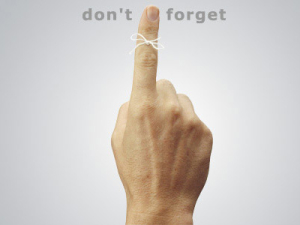Anyone who is older than 40 probably worries about loss of memory. In fact, our brains do begin to slowly deteriorate by our late 20s. But there are some memory issues that indicate there is something more serious going on than normal aging. Below are a few guidelines to keep in mind about your memory loss. If you are experiencing these, you will want to be evaluated by a doctor as soon as possible:
Your Memory Loss Scares You
We all get annoyed when we lose our sunglasses or car keys. Or maybe you forget where you parked your car. These things can upset us. But if you start to feel very uneasy about your memory lapses, then this is something to pay heed to. For instance, you might be worried about where you parked your car, but you forgot it’s in your driveway.
If you start making a lot of lists to remember to do things, you should be evaluated by a doctor.
Doctors say that many people with early dementia become frightened by their memory loss. They know something is just not right.
Another example is if you put a common household item in a strange place, such as putting your car keys in the fridge. Or, you are driving to work and you suddenly have no memory or where you are or what you are doing. All of these are signs that something serious is going on.
You Changed How You Work or Play Because Of Memory Issues
The big distinction between regular memory loss and Alzheimer’s is that the symptoms of the latter start to interfere with daily life. Many people who have early dementia cannot remember how to do certain tasks very well anymore, but they still are cognizant that something is not right.
So, you will compensate by making detailed lists of what needs to be done. You might leave notes around reminding them to check the list. You may start emailing more because you can’t follow telephone conversations. You buy more take out food because you can’t cook properly anymore.
Friends and Family Start to Notice
If your loved ones are regularly making concerned comments about your loss of memory, they could be on to something. A 2010 study at the Washington University School of Medicine in St. Louis determined that family and friends often see the early signs of Alzheimer’s, even better than screening tests and expensive diagnostic tests. You also will probably find yourself in arguments with your family about what you said or did.
Your Family Starts to Cover For You
Your family or friends may not want to tell you that they are noticing something is not right with you, but they will volunteer to do things for you, such as order your meals, cook for you, drive at night and manage your checkbook. Covering for you like this is a sign that they do not have confidence that you can do regular daily tasks anymore. This is a sign that you should be evaluated by a doctor.
For people who do eventually develop dementia, we offer a wide array of helpful products that make life much easier. The Dependa-Bar Grab Bar makes getting in and out of the tub much safer and easier, and the Granny Jo Bath Cape is a unique bath robe that helps eliminate the problem of wrapping yourself in a towel after you get out of the bath or shower.

